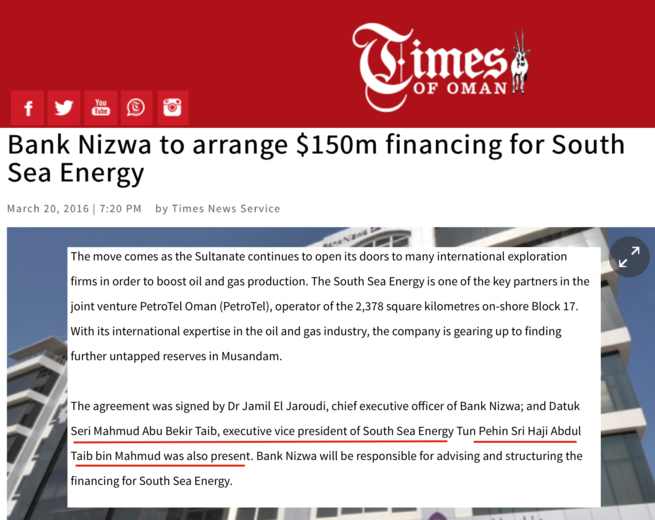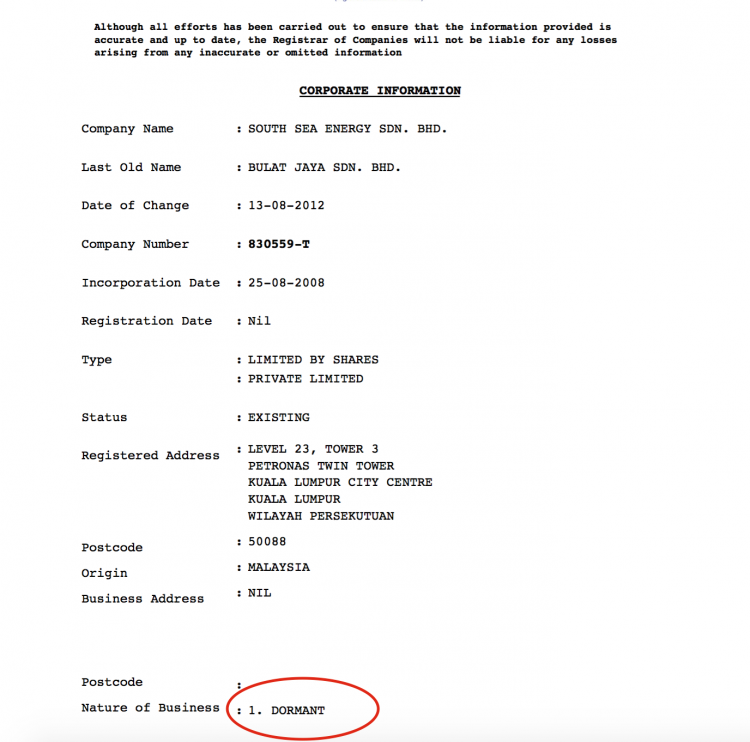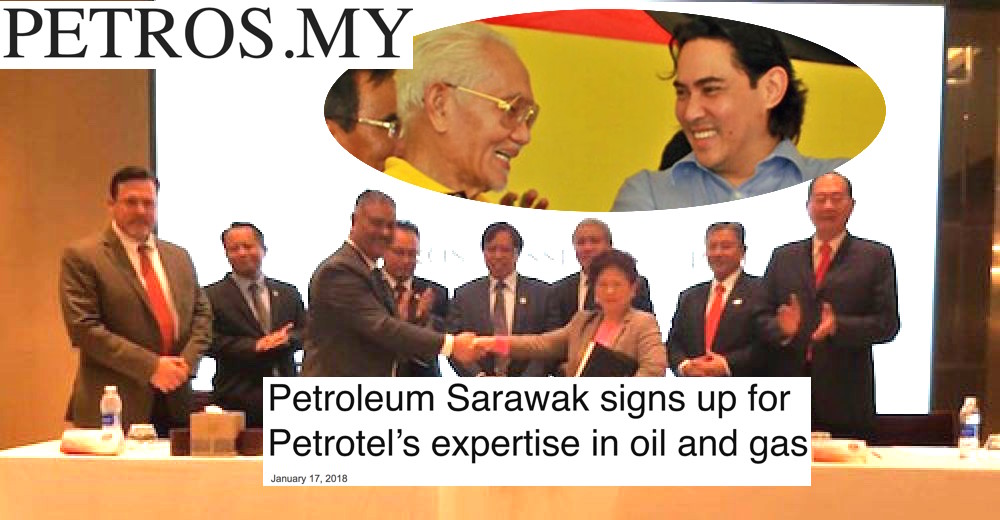On the afternoon of 20th March 2016, in the dusty heat of the desert kingdom of Oman, two far eastern visitors set about finalising a major deal with the local Bank Nizwa to raise a $150 million financing arrangement (Sharia compliant, of course) to enable investment in Oman’s massive new oil exploration Block 17.
The facility was granted to their company in its capacity as a key partner in PetroTel Oman (PetroTel), the operator of the 2,378 square kilometre prospective oil field.
We know about the matter because it was all announced in the national Times of Oman newspaper. The report also named the company involved, South Sea Energy, which it described as holding ‘international expertise in the oil and gas industry’.
And it identified the two individuals present at the signing of the arrangement with the bank on behalf of South Sea Energy. They were named as Datuk Seri Mahmud Abu Bekir Taib, executive vice president of South Sea Energy and his father the Sarawak Governor, Tun Pehin Sri Haji Abdul Taib bin Mahmud, according to a media statement made by the bank.

The close involvement of the Governor of Sarawak in this business venture of his son’s will come as little surprise to those who are aware of the blatant use the veteran kleptocrat has made of his family members to act as fronts for his global business activities. But, rarely has he allowed himself to be so caught out at the scene of the action.
Questions
Sarawak Report would like to enquire what exactly the financial interests of the Taib family are in this company South Sea Energy, which it has been announced is now closely involved in the Sarawak State company Petros’s first venture, that just happens to be also linked to Oman’s Block 17? What exactly are the terms of the MOU betweem Petros and South Sea Energy referred to in those announcements?
Furthermore, on what collateral did the Bank Nizwa agree to raise the vast sum of $150 million for South Sea Energy Sdn Bhd, given that the company, which was incorporated in 2008 and registers only one office (in Petronas Towers) and is categorised as “Dormant” in the Register of Companies?

If Taib and his various Sarawak crony parties wish to sign up to the Harapan coalition, they need to sign up to the basic principles of openness and transparency espoused by the new government.
Meanwhile, the revelation that the Taib’s are intimately connected with companies at the heart of the new petroleum deal involving Petros throws light on the state’s sudden new enthusiasm for regaining control over Sarawak’s petroleum rights, allegedly with the interests of the people in mind.
Sarawak’s Sudden Petroleum Grab – For The People Or The Politicians? (Transparency Check)
Move on from the desert scene exactly two years, to March 2018 and an astonishing reversal of petroleum policy by the Sarawak Government, just short of the GE14 general election, when weakened former prime minister Najib Razak was engaged in a desperate battle to retain power.
To have any chance of holding on to office Najib needed to retain the support of the Sarawak political mafia, which has been under the firm grip of Taib Mahmud for four decades, first in his capacity as chief minister and now as governor of the state. Taib controlled vital seats and It would appear this reversal of policy was Taib’s price for continuing to support BN, although he was also being courted by his old ally the now opposition leader Dr Mahathir.
“Taking Back Control Of Sarawak’s Oil”
For decades opposition spokespeople in Sarawak had decried the outrageous and patently illegal arrangement by which the state’s precious oil reserves were being sucked out by the federal government through Petronas with a mere 5% royalty set aside for the state.
It was a major plank of the opposition manifesto that the royalty should be raised to 20% to allow for at least some infrastructure and investment, after decades during which only West Malaysia appeared to benefit from East Malaysia’s oil revenues.
Yet, for all that period, the ruling Sarawak coalition led by Taib, which based its power on a federal alliance with Malaysia’s ruling BN, had refused to countenance such an idea. The previous chief minister, Adenan Satem had flirted with taking up the opposition demand for the 2016 state election, but Najib had slapped it down.
After all, the so-called Malaysia Petroleum Development Act of 1974 had been specifically negotiated by Taib himself (whilst the federal national resources minister) together with his uncle (at the time Sarawak’s chief minister) as part of a tacit deal with their BN allies in the federal government (led by Najib’s father, the then PM Tun Razak) who agreed to let the Taib/Ya’acub family take all the revenues from Sarawak’s timber and land resources, in return for the surrender of Sarawak’s oil.
The fact that this family carve-up of the riches of Borneo was highly illegal did not impede either side in the slightest, as they put their signatures to the deal. The 1974 Petroleum Development Act had no validity because the parties had failed to get it ratified, as required under the constitution, by Sarawak’s State Government, which was the legitimate authority over the resources of the state, including oil.
The reason for the failure to ratify was, of course, that such permission would never have willingly been granted by the representatives of the people of Sarawak. However, for decades Taib has stood by the agreement that 95% of Sarawak’s oil revenues should go to the federal government, as he developed his own economic stranglehold over every other money making activity.
In 2012, whilst still in a politically commanding position, Tun Razak’s son Najib Razak, took the raid on Sarawak’s state oil a step further instituting the Territorial Sea Act 2012, which again violated the constitution by appropriating even more of Sarawak’s oil fields rightly belonging to the state. The move incited more anger in Sarawak as opposition MPs picked up on the further injustice and it helped propel a popular agenda to regain the state’s oil rights to the political centre stage, even to provoke the distinct rumbling of a pro-independence mood.
So, what of the stance of now Governor Taib, who had every reason to resent Najib, after he had kicked him upstairs to the governor’s office in the face of growing criticism over the years of blatant multi-billion dollar corruption antics fronted by his family?
The fact that his state had been robbed of its vital resources for decades appeared not to have concerned this political leader one bit, because Taib personally was making billions out of the deal that gave him carte blanche to help himself to the rest of the available wealth of the state.
Through a disgraceful series of secretive contracts he felled the Borneo Jungle and parcelled out the land for lucrative oil palm concessions and meanwhile absorbed the vast majority of government contracts into his network of appropriated companies now in the hands of his own family.
How this multi-billion dollar kleptocracy could in any way be deemed legal or legitimate or in anyway within the law beggars belief. Only an absolute monarchy of the most primitive kind or direct dictatorship ould permit such abitrary theft and Malaysia is a constitutional democracy. Taib’s employment within that democratic framework has been to represent the people and it is simply unnacceptable to ‘clear’ a man who has misappropriated billions through secret contracts and concessions, negotiated out of sight.
Taib’s excuse is that he “left the room” when decisions benefitting him were executed by his underlings, thereby providing him with deniability, according to a law enacted by Najib’s hopelessly corrupt government in 2009. Likewise, Najib has attempted to say that the decisions which transferred billions from 1MDB into his bank accounts were made by juniors.
It does not wash in either case and if Najib is agreed to have been corrupted, he was only following in the footsteps of his world class mentor, Taib Mahmud.
What Is Good For Taib Is Good For Sarawak?
Following the 2012 Territorial Sea Act, Taib for the first time embarked on a bit of his own local oil extraction on land. He may have been venturing back into the space prodded partly by Najib’s growing electoral weakness (the 2013 election was a close run thing). but also perhaps by the diminishing prospects of his earlier business models for continuing enrichment thanks to Sarawak’s resources.
The timber of Borneo by then was almost expired (apart from thieving from national parks and across the border) and oil palm plantation concessions had been largely handed out. ‘Phase 3’ of Taib’s original plans to keep growing his multi-billion dollar personal empire was an industrialisation programme, dubbed SCORE.
However, SCORE had been flagging, given its impracticalities and Taib’s own failings as a business visionary. The damming up of Sarawak’s rivers has been controversial for countless environmental and community reasons and inward investment has proven limited.
Oil extraction on the other hand, represents a return to Taib’s original money making model, namely power abuse and resource grab. In late 2012 therefore, an innovation was announced with the handing of a major on-shore concession (illegally in that the concession was not tendered and was awarded behind closed doors) to one of Taib’s most established business crony partners Tiong Hiew King, owner of the plantation and timber giant Rimbunan Hijau.
Tiong was a novice in oil extraction, however if money was to be made, why not keep it in the ‘family’? The Tiong and Taib families have been symbiotic, as with all the major timber companies granted concessions by Taib over past decades.
It is therefore of perhaps little of surprise that as South Sea Energy Sdn Bhd has hoved into public view in Sarawak over the past few weeks, the man touted to the newspapers as the ‘executive director’ of that company is indeed none other than Hiew King’s brother, Tiong Kiong King, with no mention of the executive vice presidential role of Abu Bekir Taib or indeed of the involvement of Taib himself.
Southsea Energy Sd Bhd
So, what of Sarawak’s new petroleum policy and Southsea? Well, the evidence shows that shortly before the major announcement of the Petros venture in March, the present Chief Minister, Abang Johari had himself beaten his own path to Oman, in January, where he signed a Memorandum of Understanding (MOU) with none other than Petrotel Energy Oman LLC (described previously as a joint venture, in which South Sea Energy run by the Taibs was a key partner) to “explore the possibility of co-operation to develop the downstream sector of oil and gas industries in Sarawak”.
Moreover, as announcements by the newly established Petros confirmed, South Sea Energy, described as an “International oil and gas company with links to Sarawak”, was also a signatory to the MoU. Tiong was featured in the line up on the occasion, described as ‘Executive Director’, but there is no mention of the Taibs – had they sold out by then?
Following this inaugural development, which appears to have brrnsubjected to the barest scrutiny and oversight, Sarawak’s startling new policy was launched in March whilst Najib was at his moment of greatest pre-election weakness. The new position came in a declaration by Taib’s Chief Minister that there was to be an over-turning of the decades of oil subserviance to Petronas.
Out-playing the opposition entirely, it would appear, Abang Johari announced that the Sarawak state government would be moving to seize back control of its oil reserves through its new 100% controlled state company, Petros, in order (allegedly) to exploit its oil resources for the benefit of the Sarawak people.
Backing Johari’s position, a movement called Suarah Petroleum Group Sarawak (claiming to represent ‘oil industry professionals’) issued stirring statements to the local newspapers declaring that the ‘People of Sarawak’ were reclaiming their rights through the move. Yet, there had been no debate about the plan to create Petros and very little information made available about how the company would work or distribute any benefits:
All Sarawakians must support this revolutionary move, as it immediately gives tangible hope for the equitable redressing of economic imbalances faced by Sarawak from the uneven distribution of economic value-creation and being subjected to unfair exploitation policies/practices of its rich oil and gas natural resources.
For avoidance of any doubt, it is no longer ‘business as usual’. The Sarawak Government officially no longer recognizes the Petroleum Development Act 1974 (“PDA74”) that had unconstitutionally vested Sarawak’s petroleum resources with Petronas. [Suarah Petroleum Group]
This has, alI in all, constituted a stunning and daring direct challenge to Petronas and the arrangement of the past four and a half decades, causing the federal agency to launch a legal bid shortly after the election to establish its status through the courts. It is a case that has been put on hold by the incoming government struggling to manage myriad issues, but more than anything the Petros venture is a sign of confidence on the part of Taib, faced with central government weakness first thanks to the collapse of Najib’s influence and then the arrival of the new reforming government, possibly willing to do a deal.
The opportunity to couch the Petros move in the language of the opposition’s own campaign to bring revenues back to the Sarawak people has been fully taken advantage of by promoters of Petros, like the anonymous Suarah Petroleum Group*(note):
To ensure that proper management and governance is in place to safeguard the state’s resources and its environment, the Sarawak Government should without delay set up the Sarawak Petroleum Authority, reporting directly to the Chief Minister or perhaps to a newly created Ministry of Energy, with full powers and authority to control and regulate ALL aspects of the petroleum industry in Sarawak.
Most importantly, Sarawak must be able to craft its own strategic policy and values of having control and ownership of its oil and gas resources aimed to promote the best utilisation and value creation from the Sarawak’s resources. These policies and values will underpin the terms and conditions of, amongst others, the fiscal regime, procurement policies and giving priority to Sarawak companies.
But, how convincing is it? After all the state government is still packed with Taib’s creatures, (Sarawak was one of the few areas of the country where sweeping changes were not achieved thanks to Najib’s election disaster). Are we not looking once more at yet more opaque deals designed to channel wealth into Sarawak’s leadership?
Hidden Benefits
There are glaring failures of transparency and information in this contract, for a start, which bodes ill for hopes that money might at last flow towards ordinary people of the state.
But, it is the failure to note the interest of Governor Taib and his son, which is most obvious flaw. Given that back in 2016 the Taib family control of South Sea Energy was made fundamentally clear by their negotiation of the $150 million bank loan in Oman, how come no mention of the Governor’s family’s links to this company, now that it has been so mysteriously woven into the Petros contract in a role as yet to be defined?
Instead, an otherwise unheard of business lady named Lily Chin is featured as the main shareholder of SSE, along with another unheard of Wong Kung Nwak. Lily Chin was paraded centre stage at the signings of the MOU together with Taib’s trusted business crony Tiong Kiong King, described as ‘executive director’, despite the fact there is no mention of Tiong as a director in the company register.
Examination of the company’s website (it was incorporated in 2008 and is registered as ‘dormant’) provides little clue as to the activities of the company nor is there any named executive or location specified, beyond its office address in the Petronas Towers.
This ‘experienced international company’ appears to have no projects it is prepared to share with readers, although it claims activities in Malaysia and Indonesia, which are the two areas where Rimbunan Hijau’s own oil operations are based.
Lily Chin’s background or credentials as an oil executive are not detailed anywhere on the web.
There is nothing surprising to Sarawak watchers about what appears therefore to be emerging as a no more than a sham policy to ‘return Sarawak’s oil revenues’, when the priority appears to be to yet again provide the Taib family and its cronies a lucrative grip over the vaunted Petros project.
For the entire past half century Taib has identified Sarawak’s interest as being what enriches him personally.
It is not even surprising that the obedient former AG Gani Patail chose to ‘clear’ Taib back in 2013 when presented with an MACC report, much in the same way that his successor ‘cleared’ Najib.
What is surprising is that the present government appears willing to tolerate this drift in events, as the supposedly failing Governor makes yet another grab at the riches of his state – old habits die hard.
* Suara Petroleum Group point out they place names on their website. SR has suggested they add the relevant identies of these individuals and their connection to the industry.

